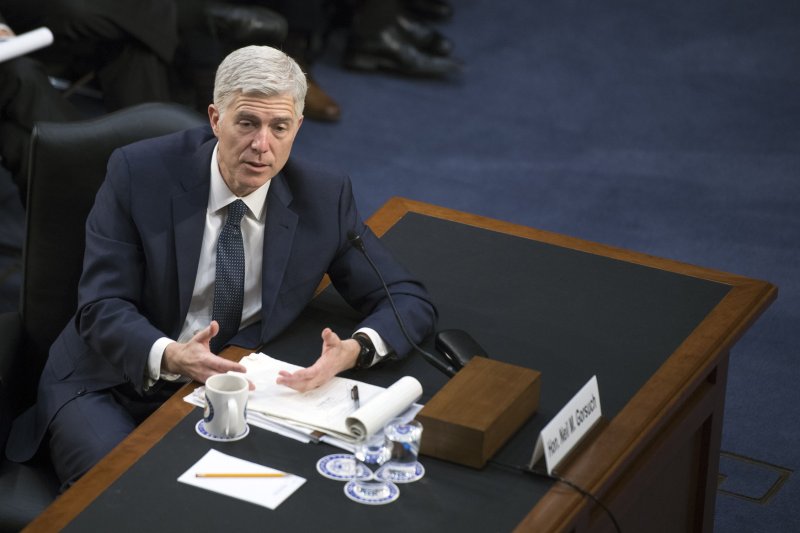Supreme Court Justice nominee Neil Gorsuch testifies during the third day of his confirmation hearing before the Senate Judiciary Committee on Capitol Hill in Washington, D.C. on Wednesday. Photo by Kevin Dietsch/UPI |
License Photo
March 27 (UPI) -- The full Senate and its judiciary panel won't be able to vote on the Supreme Court nomination of Neil M. Gorsuch for at least a week, after opposing Democrats initiated a procedural delay Monday.
Democrats on the Senate Judiciary Committee asked for a week's delay in the panel's confirmation vote, meaning it will be next week at the earliest before the appointment of the 10th Circuit judge can be advanced to the full chamber.
Gorsuch largely cruised through his hearings last week before the judiciary panel, where he faced repeated questions about his record, ideology, intentions and ability to stand up to President Donald Trump on the nation's top appellate bench.
The committee would likely have voted on the Gorsuch nomination early this week if Democrats hadn't initiated the postponement. If the panel votes next April 3, as scheduled, the full Senate vote would likely happen within the following four days before Congress begins its Easter recess.
Any member of the judiciary committee can call for a weeklong delay in a vote.
Last week, Senate Minority Leader Chuck Schumer said he plans to vote "nay" on Gorsuch's appointment and will lead a Democratic filibuster -- a procedural stall tactic.
Ordinarily, any Supreme Court nominee needs only a simple majority in the Senate for confirmation -- 51 votes. To get around a filibuster, however, a nominee needs a supermajority of 60 votes.
With the filibuster all but assured, that means Republicans need to persuade eight Democrats to support their candidate -- or nine if Sen. Johnny Isakson, R-Ga., recovering from back surgery, is unable to vote.
The fight is yet another example of the growing political divide between the president's party and Democrats and progressives. So far, the only Democrat who has refused to take part in Schumer's filibuster and is likely to vote for Gorsuch is West Virginia Sen. Joe Manchin, who's sided with Republicans on other issues in recent months.
"That's not what the Founding Fathers decided for this body," he said Thursday. "This body is a very unique body, a very deliberate body, supposed to be the teapot cooling the tea off."
So far, 10 opposing Democrats have agreed to participate in the filibuster and eight others, who said they will vote against Gorsuch's appointment, are considering joining them.
Further, Republicans must overcome Democrats on two fronts -- opposition to Gorsuch based on his merits, and resistance still boiling over from the GOP's defeat last year of former President Barack Obama's Supreme Court nominee, Merrick Garland. The Washington, D.C., appellate judge, nominated March 16, 2016, after the death of justice Antonin Scalia, remained in limbo for 293 days without ever getting a hearing from Senate Republicans. His nomination expired Jan. 3 and many Democrats view any Trump nominee other than Garland to be an effective GOP "theft" of the high court seat.
"He deserves [an] up or down vote," Senate Majority Leader Mitch McConnell said via Twitter, repeating exactly what Democrats said last year of the GOP rejection of Garland.
"Some people think it's hyperbolic to suggest that the seat was 'stolen.' But how else to describe it?" the Los Angeles Times' editorial board questioned Saturday. "Republicans took the opportunity to fill the vacancy away from Barack Obama without justification and delivered it up instead to Donald Trump."
Senate Republicans do have a "last resort" option in the matter -- also referred to as the "nuclear option."
Under Senate bylaws, GOP lawmakers could render Democrats' stall tactic moot by changing procedural rules to prohibit filibusters for Supreme Court nominees -- a strategy that's favored by Trump. If that happens, Gorsuch's confirmation returns to the simple majority threshold of 51 votes.
Though the GOP controls both houses of Congress, resistant Democrats continue to prove that they still wield considerable ability to freeze out unpopular Republican efforts. Last week, House Democrats helped defeat the American Health Care Act, the GOP plan to abandon Obama's Affordable Care Act.















